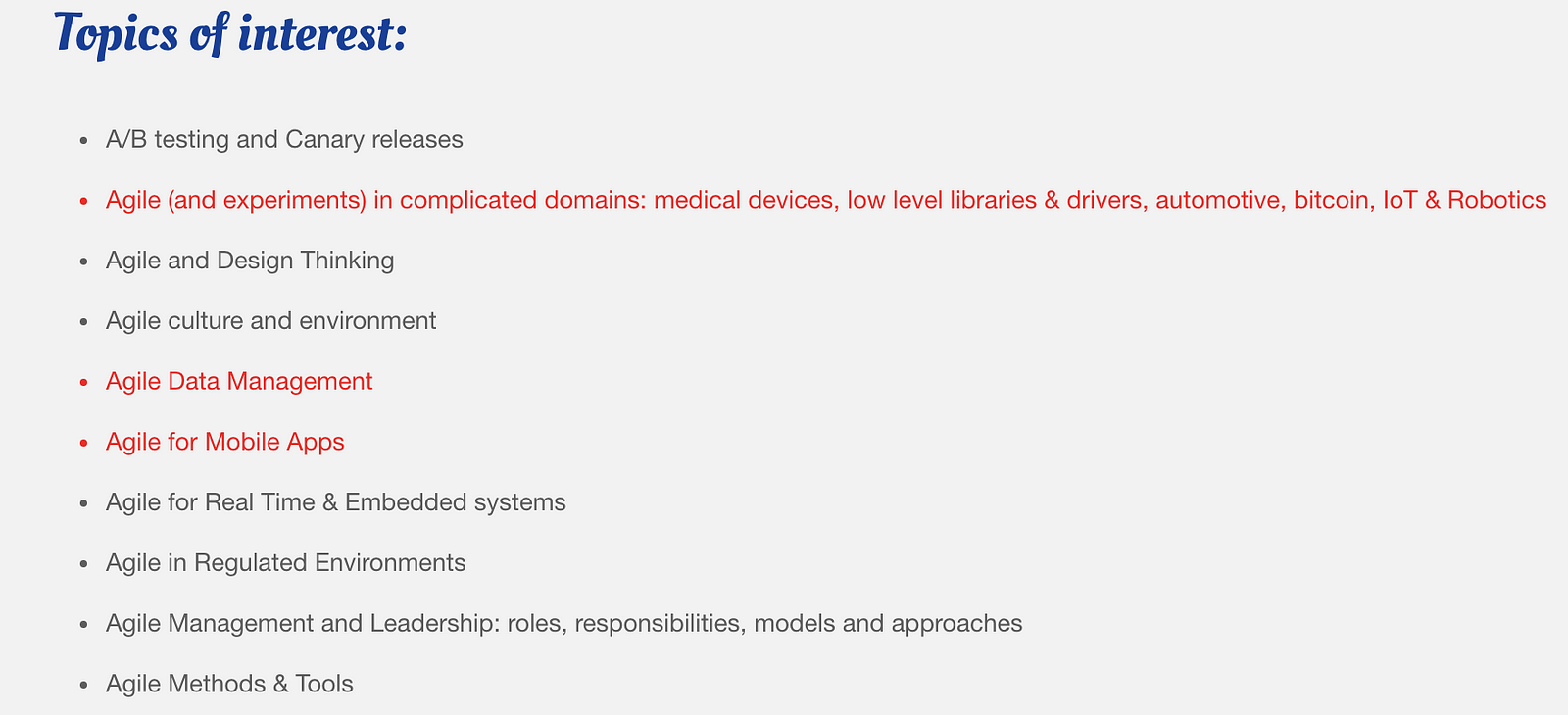If you read my Oracle Open World: A Newbie’s Retrospective post, I’ve hopefully convinced you that conferences are must-attend events. The knowledge-gain and networking opportunities offered across a few days simply can’t be matched elsewhere.
To maximize your conference experiences, you should not only attend, but also speak.
How does one get started on the conference speaking circuit? Read on, my friends, it’s not as daunting as it may seem.
Why Speak?
Before we discuss how to break into this world, we’ll discuss why you should. With a fear of public speaking often considered the number one fear in society, you’re likely wondering why you should willingly bring this upon yourself.
You’ll Grow

Speaking at conferences provides you a platform to share your expertise with a wide population of individuals. You know more than you think you know, and there are others out there that can benefit from this expertise. When you speak on a topic, you often conduct more research and put more thought into it than you would have otherwise, furthering your expertise in that area. You may not have been an expert at the onset, but you most certainly will be at the outset.
If you happen to have a fear or nervousness of public speaking, forcing yourself to speak publicly is a great way to overcome it. What better avenue to do so than on a topic you’re comfortable with? It’s intimidating, but it’s surmountable. And with each presentation it gets a little bit easier.
Public speaking also helps with smaller scale delivery and projection — whether it be professional networking events, one-on-one business meetings, or simply the way you carry yourself in your daily life. Public speaking instills a confidence that you carry with you long after your presentation concludes.
You’ll Expand Your Network
When you speak at a conference, people attend your session that you likely never would have encountered otherwise. Many attendees will approach you after your talk, or later in the conference, hoping to connect further. Speaking helps to expand your network to those with an interest in your topic who may not work directly in/with it, those in other industries, those wanting to break into your industry, those seeking assistance or further expertise, and even those who have additional expertise to offer you. These individuals can offer valuable insight and growth to yourself and/or your business, that your network never would have reached had you not taken the podium.
 By speaking, you may gain future colleagues, advisors, clients, and/or friends. The definite is that no matter who it is you pick up, when you speak, your network will get bigger, and that’s never a bad thing.
By speaking, you may gain future colleagues, advisors, clients, and/or friends. The definite is that no matter who it is you pick up, when you speak, your network will get bigger, and that’s never a bad thing.
You’ll Gain Groupies

When you speak, you connect with attendees in your audience who come to respect your expertise. Many will seek to connect with you after your session so they can continue to benefit from it. Often, these connections surface via new followers for your blog(s), podcast(s), YouTube(s), and social media accounts. Who doesn’t love followers? The more, the merrier! In addition, a strong following increases your chances for being selected to speak at future events. And many of these “groupies” will follow you to those events.
You’ll be “Paid” for Speaking
“There’s no such thing as a free lunch”
– Milton Friedman
It’s impossible to get something for nothing, right? This concept applies to conference content as well as it does anything else. Conference committees don’t expect their speakers to deliver content without receiving something in return. This may come in the form of direct payment, conference attendance discounts, a full conference pass, speaker gifts and receptions, and/or covered travel and lodging.
In my personal experience, it is most common that you will receive a full, complimentary conference pass in exchange for speaking. As many conference registration fees run in the thousands of dollars, this can represent quite a bit of financial savings. This also provides you with the opportunity to attend the sessions delivered by other experts throughout the conference. A great bargain in my opinion! In most cases you will have to cover your own travel and lodging, however, so keep that in mind when planning where and when you wish to speak.
Getting Started
Now that we’ve established why you should speak at conferences, we’ll discuss how you can get started. Research conferences, user groups, local meetups, etc. that represent the industries and/or specialties with which you work. Google is, of course, a great resource for this research. Services such as AllConferences.com and Lanyrd provide a one-stop shop for browsing conference offerings by industry, specialty, region, etc. Meetup.com is a great place to find local groups and upcoming events.
(Local conferences and events provide a great avenue to start small with public speaking before making the national jump if thats more in your comfort zone.)
Not all conferences in your industry or specialty will be a fit for you. It’s important to dig into the conference website, research its topic wish-lists, and browse its historical session catalog to determine not only if the expertise you offer meets their requirements, but also that the content they offer will in turn further your own growth. As stated above, when speaking at a conference, you are most often able to attend it as well. Content that is mutually beneficial to you as both a speaker and an attendee make for the ideal conference candidate.
 As you conduct your research, maintain a list or calendar of conferences with their approximate submission and event dates — most occur the same week, month, quarter, etc. year to year. As you grow in the speaking circuit, this resource will help you manage your upcoming abstract submission deadlines and potential travel commitments.
As you conduct your research, maintain a list or calendar of conferences with their approximate submission and event dates — most occur the same week, month, quarter, etc. year to year. As you grow in the speaking circuit, this resource will help you manage your upcoming abstract submission deadlines and potential travel commitments.
It’s important to note that not all conferences will offer an open call for abstracts or speakers. Some will instead require you to e-mail the conference organizer or content chair and express your interest in speaking. Do not shy away from these conferences simply because there isn’t an open call to everyone. If you feel the conference is a fit for you and that you have the expertise they seek, go for it!
The Content

After you’ve narrowed down the conference pool to those you’re interested in speaking at, it’s time to determine what you are going to propose you speak on and how you are going to convey the details of the topic.
The easiest way to determine the what is to reference the conference website. Have they provided a list of topics of special interest to them? Many do. For example, the Agile Testing Days USA Conference has provided a large list of topics of particular interest. OAUG, one of the three user groups putting on the Collaborate 17 conference, has done the same. If you can speak to one of these topics, you have a much better chance of your abstract being selected.
For conferences that do not provide a list of topics of interest, their conference tracks and historical session catalogs will prove your secret weapon. Conference tracks will provide direction on topics they are slotting content into, while historical session catalogs will provide you examples of the types of sessions and content that have been accepted in the past.
When it comes to writing the content of your abstracts, the historical session catalog is again your secret weapon. The summaries of each topic for most all conferences represent the abstracts as they were submitted to the conference committee. The manner in which the topic is conveyed, the level of detail that is discussed, the length of the abstract, whether the abstract should leverage bulleting and lists, etc. can all be derived by examining the historical session catalog (the catalog of past abstracts that have been accepted).
The most important take-away on the topic of content is that you need not over-engineer your topics or abstracts. Your abstracts don’t necessarily have to be on some big, newfangled idea or concept to get selected. Such topics are usually welcome by most conferences and should be pursued if you have the expertise to speak on them; however, it’s sometimes the classic topic that you feel everyone might already know about or that you think may be overdone that the selection committee is actually looking for. Just because the experts may be “over” a seemingly simple topic, the conference audiences often are not. An abstract on such a topic might just be the one that gets you selected. Research your conference audiences and historical session catalogs, and submit appropriately — different abstracts cater to different conferences.
What Comes Next
After submitting your conference abstract, you’ll generally receive instructions as to when you will be notified whether you have been selected. This may range from a few weeks to several months. If selected, you will then have a designated time frame to accept or decline the opportunity. It is perfectly acceptable to decline an opportunity, perhaps due to unanticipated conflicts or financial burden; however, this should be your exception rather than your norm.
If you accept the speaking opportunity, you will most likely be provided with a list of tasks you must complete and timeline for completing them in order to maintain your speaking status. This will include tasks such as updating your speaker bio, uploading a professional headshot, uploading your slides, and perhaps uploading a white paper that examines the topic you will be presenting in great detail.
My Personal Experiences
Over the last several years, I’ve had the opportunity to speak across the country at several different conferences. Admittedly, I submitted my first abstract ever only because it was required by the company I worked for at the time. At the time, I was truly terrified of having to actually speak and harbored a secret wish that I wouldn’t be selected. Two months later I received the congratulatory e-mail, and it was happening, fear or no fear.
That first presentation was quite terrifying, just as I expected. A room full of people, many of them industry experts I recognized from social media (and, full confession, many of whom I followed quite fanatically), there to hear mespeak? For my first conference presentation ever? Yeah, I’d say that was a pretty terrifying milestone to achieve. But I womaned up and went after it and when it was over I deservedly let out the biggest exhale ever to be exhaled. And then my professional world opened up.
Several years and half a dozen conference presentations later, my career has grown exponentially, and I can tie most of that growth to the speaking circuit. That first presentation? It was the direct avenue to the amazing job I hold today as it’s where I learned about my future bosses and they learned about me. I’d spent a lot of years seeking the “perfect job” with little success, and with just one conference presentation I found a duo that could offer it to me. Talk about network expansion!
That presentation was also the springboard to future ones. Once you’re a proven presenter, you’re much more likely to be accepted in the future.
Those future presentations have rendered me an accepted member of the BI & Analytics “cool crowd”, and I now rub elbows with those industry experts I confessed that I followed quite fanatically. (Full confession: I still follow them quite fanatically and am awed by their knowledge)
Those future presentations have also gained me a few groupies. (You’re reading this, aren’t you?) And now, being a proven presenter, I’m much more likely to be selected for the future conferences to which I submit.
I still get nervous. Each and every time. True veterans have told me they think nothing of speaking, and perhaps one day I’ll get there too. Knowing my personality, that’s unlikely. I think it’s just my style and I actually believe the nerves help me a bit. Nerves or no nerves, speaking at conferences is now something I truly enjoy and look forward to. With the opportunities that have arisen from it, how could I not?
Just Go For It
You now have the keys to entering the conference speaking kingdom, and if you have any inkling that this is an avenue you’d like to pursue, take the plunge and go for it. No matter your motivations — attending conferences you wouldn’t be able to otherwise, expanding your network, growing your business, overcoming your fear of public speaking, etc. — I guarantee you that the longterm benefits far outweigh those you are currently envisioning. If you need more evidence of this, simply look into my journey more closely.